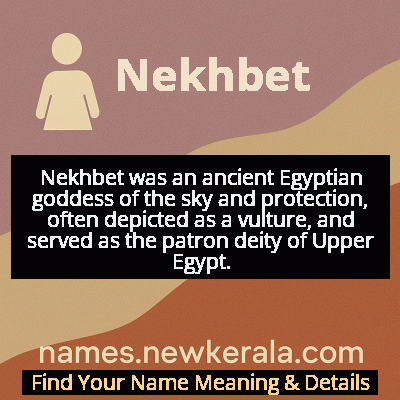Nekhbet Name Meaning & Details
Origin, Popularity, Numerology Analysis & Name Meaning of Nekhbet
Discover the origin, meaning, and cultural significance of the name NEKHBET. Delve into its historical roots and explore the lasting impact it has had on communities and traditions.
Name
Nekhbet
Gender
Female
Origin
Egyptian
Lucky Number
2
Meaning of the Name - Nekhbet
Nekhbet was an ancient Egyptian goddess of the sky and protection, often depicted as a vulture, and served as the patron deity of Upper Egypt.
Nekhbet - Complete Numerology Analysis
Your Numerology Number
Based on Pythagorean Numerology System
Ruling Planet
Moon
Positive Nature
Diplomatic, friendly, artistic, empathetic.
Negative Traits
Over-sensitive, moody, indecisive, prone to self-pity.
Lucky Colours
Green, cream, white.
Lucky Days
Monday.
Lucky Stones
Pearl, moonstone.
Harmony Numbers
1, 3, 4.
Best Suited Professions
Diplomats, mediators, caregivers, artists.
What People Like About You
Cooperative spirit, friendliness, artistic talent.
Famous People Named Nekhbet
Nekhbet (Mythological)
Egyptian Goddess
Principal protector of Upper Egypt and patron goddess of pharaohs
Nekhbet Priestess (Historical)
High Priestess
Served as chief priestess at Nekheb temple complex in El-Kab
Dr. Nekhbet Williams
Egyptologist
Leading researcher on Predynastic Egyptian religion and goddess worship
Name Variations & International Equivalents
Click on blue names to explore their detailed meanings. Gray names with will be available soon.
Cultural & Historical Significance
Extended Personality Analysis
Those named Nekhbet often embody the protective, watchful qualities of their namesake goddess. They tend to be natural guardians who instinctively look out for others, particularly family and close friends. This protective instinct combines with remarkable patience and strategic awareness—they observe situations carefully before acting, much like the vulture circling high above. Nekhbet-named individuals typically possess strong organizational skills and a methodical approach to problem-solving, preferring to address issues at their root rather than applying temporary fixes. They value stability and tradition, often serving as the 'memory keepers' in their families or communities. While they can appear reserved or distant initially, this stems from their observant nature rather than aloofness. Their loyalty, once earned, is absolute and enduring. However, their protective nature can sometimes manifest as controlling behavior or difficulty delegating responsibilities, as they feel compelled to ensure everything is handled properly. Overall, they represent the balance between fierce independence and deep communal connection.
Modern Usage & Popularity
In contemporary naming practices, Nekhbet remains exceptionally rare, primarily appearing in academic, historical, or pagan communities with specific interests in Egyptian mythology. The name has never appeared in the Social Security Administration's baby name database in the United States or equivalent registries in other English-speaking countries. Its usage is mostly confined to Egyptologists, historians, fiction writers creating Egyptian-inspired characters, and members of neo-pagan traditions like Kemeticism. The name's strong association with vulture imagery, while positive in ancient Egyptian context, can present cultural challenges in modern Western societies where vultures are often viewed negatively. However, among naming enthusiasts and mythology fans, Nekhbet is appreciated for its historical significance, unique sound, and powerful protective connotations. Recent years have seen growing interest in mythological names overall, but Nekhbet's specificity and strong cultural ties keep it niche compared to more adaptable Egyptian names like Isis or Bastet.
Symbolic & Spiritual Meanings
Nekhbet embodies rich layers of symbolism that transcend her literal representation as a vulture goddess. She represents the paradox of protection through strength and purification through transformation. The vulture, often misunderstood in modern contexts, symbolized maternal care and protection in ancient Egypt due to observations of their nurturing behavior toward offspring. Nekhbet's white coloration connects her to purity, royalty, and the blinding desert sun, while her widespread wings represent shelter and omnipresent guardianship. She symbolizes the necessary cycle of death and rebirth—the vulture's role in consuming carrion cleanses the environment, making way for new life. This translates metaphorically to the ability to transform difficult endings into new beginnings. As patron of Upper Egypt, she represents sovereignty, authority, and the protective aspect of feminine power. Her partnership with Wadjet demonstrates the importance of balance and unity between opposing forces. In broader symbolic terms, Nekhbet represents the watchful mother, the purifying force, the royal protector, and the transformative power that emerges from life's necessary endings.

